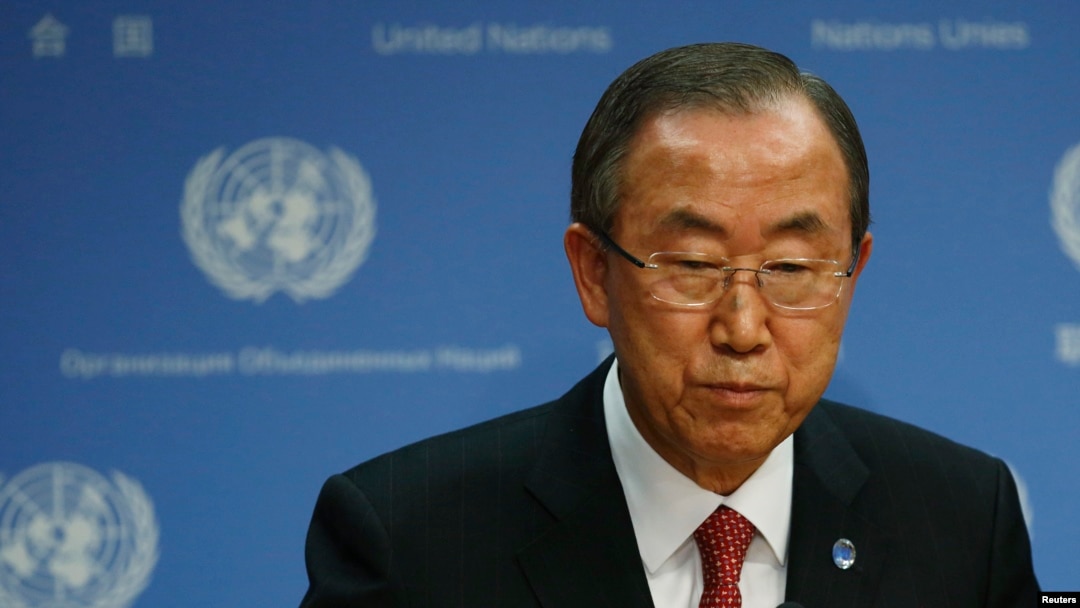United Nations Secretary General Ban Ki-moon is warning world leaders against what he called "ill-considered" military action in Syria, saying it could worsen the country's civil war.
Ban made his comments Friday at a humanitarian meeting on the sidelines of the G20 summit in Russia, where President Barack Obama is trying to win international support for possible military strikes against Syria.
The U.N. chief warned against "further militarization of the conflict," saying that military strikes "could lead to serious and tragic consequences, and with an increased threat of further sectarian violence."
U.N. special envoy for Syria Lakhdar Brahimi is also attending the conference in St. Petersburg to help Ban push for a international peace conference to help end the two and a half year-long civil war.
Global uncertainty
World leaders remained deeply divided over the Syrian crisis following the first day of the economic summit. Diplomats say a working dinner discussion on Syria lasted well into the night Thursday, with each side reiterating their position.
President Obama is looking to build a global coalition in support of military strikes against the government of President Bashar al-Assad, who the White House believes carried out a chemical weapons attack last month that killed more than 1,400 people.
Russia, Syria's main ally, has led opposition to the U.S. plan. President Vladimir Putin says there is no evidence Assad carried out the attack. Obama and Putin shook hands and smiled for the cameras Thursday, but there were no meetings scheduled between the two leaders for the summit's final day.
Obama continues push
President Obama is set to meet Friday with Chinese President Xi Jinping, who opposes the strikes, and French President Francois Hollande, who supports them. The U.S. State Department said this week the White House plan has the support of nine countries, including France, Canada, Turkey and Australia.
Russia and China both have cast vetoes at the Security Council to defeat Western efforts to hold the Syrian government responsible for the wholesale slaughter of civilians caught up in the conflict.
Obama will hold a news conference Friday before flying back to Washington, where he is also seeking to convince U.S. lawmakers to authorize Syria military action. A key U.S. Senate panel approved the plan Wednesday. But it now faces a tough vote in both houses of Congress, likely next week.
Ban made his comments Friday at a humanitarian meeting on the sidelines of the G20 summit in Russia, where President Barack Obama is trying to win international support for possible military strikes against Syria.
The U.N. chief warned against "further militarization of the conflict," saying that military strikes "could lead to serious and tragic consequences, and with an increased threat of further sectarian violence."
U.N. special envoy for Syria Lakhdar Brahimi is also attending the conference in St. Petersburg to help Ban push for a international peace conference to help end the two and a half year-long civil war.
Global uncertainty
World leaders remained deeply divided over the Syrian crisis following the first day of the economic summit. Diplomats say a working dinner discussion on Syria lasted well into the night Thursday, with each side reiterating their position.
President Obama is looking to build a global coalition in support of military strikes against the government of President Bashar al-Assad, who the White House believes carried out a chemical weapons attack last month that killed more than 1,400 people.
Russia, Syria's main ally, has led opposition to the U.S. plan. President Vladimir Putin says there is no evidence Assad carried out the attack. Obama and Putin shook hands and smiled for the cameras Thursday, but there were no meetings scheduled between the two leaders for the summit's final day.
Obama continues push
President Obama is set to meet Friday with Chinese President Xi Jinping, who opposes the strikes, and French President Francois Hollande, who supports them. The U.S. State Department said this week the White House plan has the support of nine countries, including France, Canada, Turkey and Australia.
Russia and China both have cast vetoes at the Security Council to defeat Western efforts to hold the Syrian government responsible for the wholesale slaughter of civilians caught up in the conflict.
Obama will hold a news conference Friday before flying back to Washington, where he is also seeking to convince U.S. lawmakers to authorize Syria military action. A key U.S. Senate panel approved the plan Wednesday. But it now faces a tough vote in both houses of Congress, likely next week.



